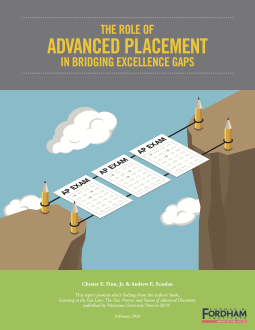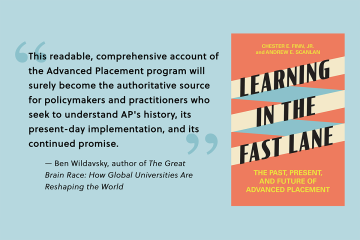This report presents key findings from Learning in the Fast Lane: The Past, Present, and Future of Advanced Placement, by Chester E. Finn, Jr. and Andrew E. Scanlan, and published by Princeton University Press in 2019.
American education has long been plagued by excellence gaps among the young people who make it into the highest levels of academic performance. Disadvantage, race, and gender matter far more than they should. Narrowing such gaps is imperative for a K–12 system that seeks both excellence and equity, and the Advanced Placement (AP) program is already making a major contribution, albeit one that could and should become even greater. Drawing on Finn’s and Scanlan’s important new book, this report—prepared for the Jack Kent Cooke Foundation—examines AP’s role in helping students from underserved populations achieve high levels of academic success. It looks closely at differences in AP participation and exam success by geography, race/ethnicity, and socioeconomic status, as well as AP’s contribution to and potential for narrowing troubling gaps.
Where students live is strongly correlated with successful AP participation. Rural high school seniors, for example, are only two-thirds as likely to take an AP exam as their suburban and urban peers, and more than half of high-poverty rural schools do not even offer any AP classes.
Socioeconomic status makes a big difference, too. Whereas AP once focused on top students in elite private and public high schools, in recent decades it has sought to help capable disadvantaged youngsters master college-level coursework before graduating. Although they’re still underrepresented, we’ve seen a dramatic increase in their AP participation. Yet students from lower-income families are less successful on the end-of-year AP exams. Though nearly half of low-income graduates who take an AP exam during their time in high school receive scores of 3 or higher, nearly two-thirds of their non-low-income peers earn similar scores.
As for race, AP’s cohorts have become markedly more diverse as participation by black and Hispanic students has grown faster than that of white and Asian students over this period. Yet here, again, we see that students of color do not fare as well on the exams.
The report lauds the gains in AP participation among poor and minority youth while urging greater attention both to further gains on that front and to strengthening their AP performance. Given AP’s capacity to help students prepare for college, gain admission, and succeed upon arrival there, expanding access to it remains an important national endeavor. States, school districts, philanthropies, and education reformers should redouble their efforts to ensure that students from all backgrounds have access not only to AP coursework but also to the preparation and supports needed to succeed on the exams. To do otherwise would wall off an important path to upward mobility, sustain societal inequalities, and constrain opportunities.





